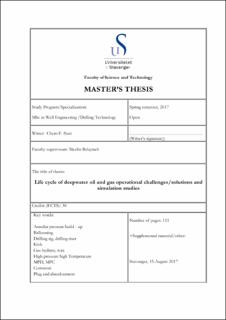Life Cycle of deepwater oil and gas operational challenges/solutions and simulation studies
Abstract
Deepwater is defined as water depths that are greater than 1 000 ft. The exploration and development activities in deepwater are the Oil and Gas industry’s biggest challenges, and they demand a huge investment. However, the high reserve potentials provide greater rewards. The purpose of this thesis is to review well’s Life Cycle challenges, and some field proved technology solutions to mitigate and control the problems.
The first section presents a literature study based on the operational problem and solutions during exploration, drilling, completion/production and plugging & abandonment phases. The major investigations of the overall studies are briefly summarized in chapter 6. For instance, based on the field case studies, Managed Pressure Drilling (MPD) and Flat Rheology (FR) are reliable technologies when operating in a narrow window and High Pressure High Temperature (HPHT) formation.
The second section presents simulation and analysis focusing on sensitivity studies of the annular pressure build up (APB) and its effect, kick tolerance (KT), well cementing, high pressure, and high-temperature effects on drilling fluid. Among the simulations studies, the managed pressure cementing (MPC) was found out to be a successful method when cementing in a narrow operational window.
The solutions for deepwater challenges are already available on the market. However, there is still a need for further technological development and new methods to improve the operation and cost effectively.
Description
Master's thesis in Petroleum engineering
